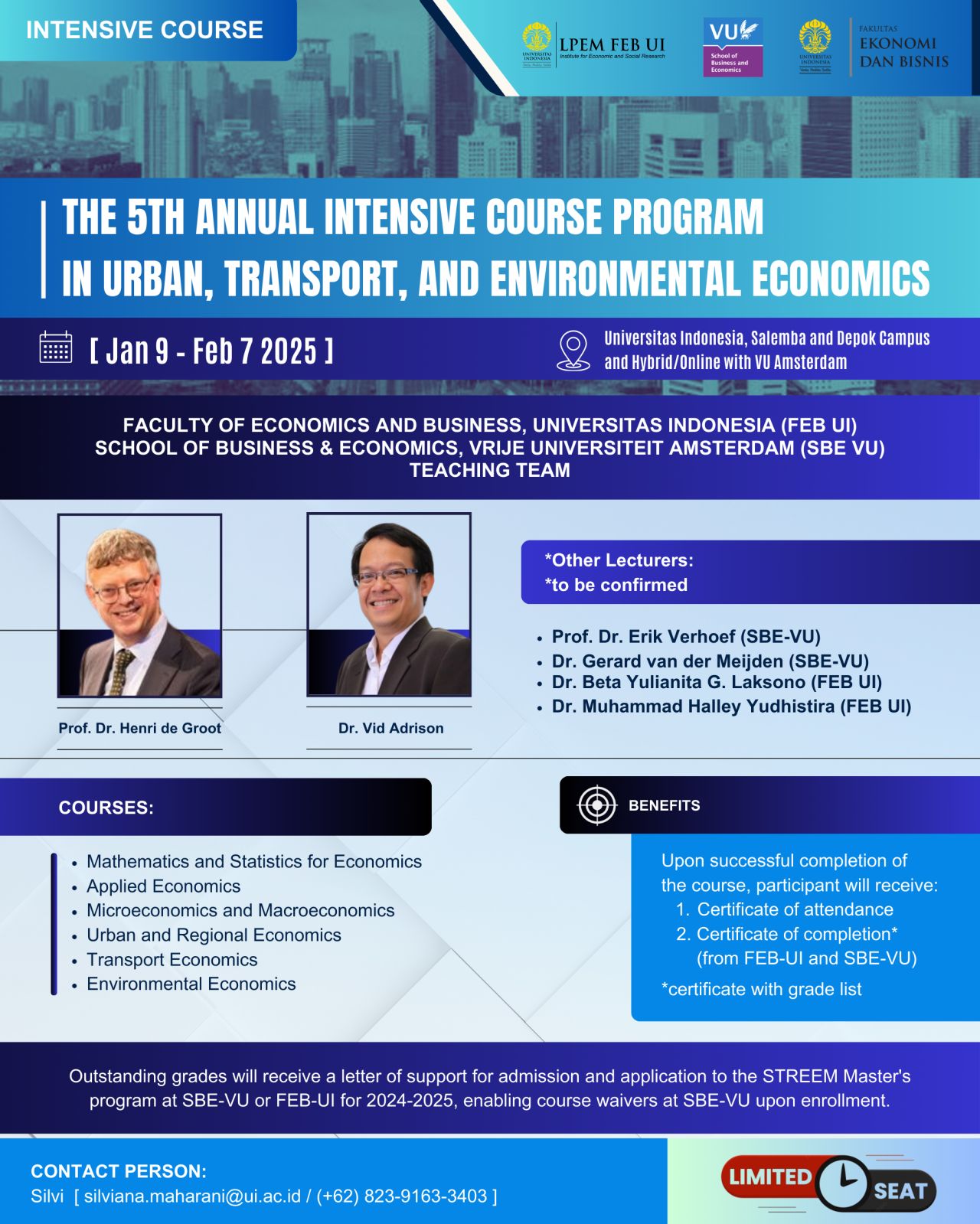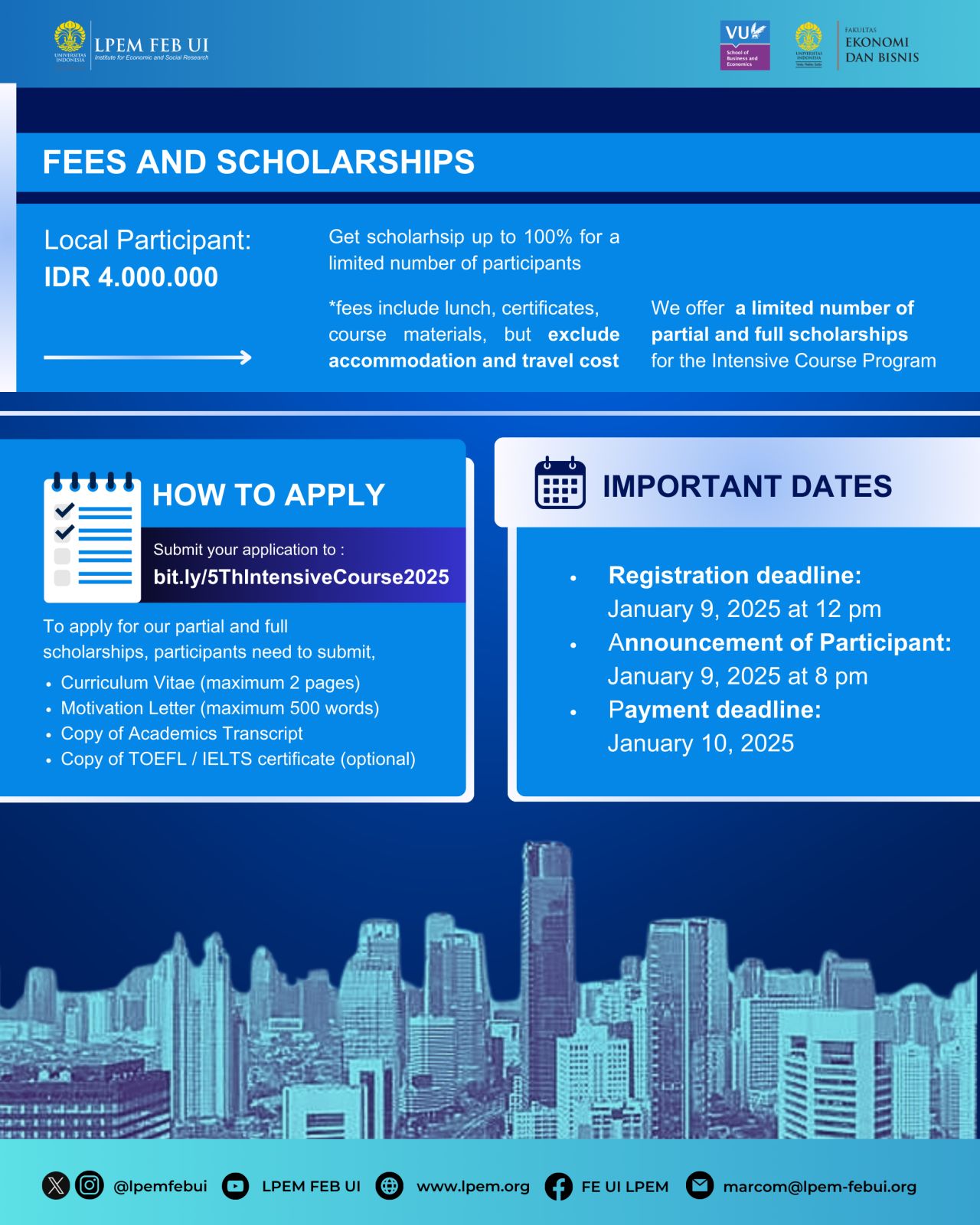Elisabete Martins
ERSA2025 Congress | Registration NOW OPEN!
|
3rd International Conference on Sustainable Regional Development in Central Asia, May 06-07, 2025, Osh, Kyrgyzstan
The 3rd International Conference on Sustainable Regional Development in Central Asia promoted by RSAI (the Regional Science Association International) in collaboration with Kyrgyz-Uzbek International University, Osh, Kyrgyzstan.The conference aims to bring together international speakers, and leading academic scientists, researchers and scholars across Europe and Central Asia to exchange and share their experiences and knowledge on all aspects of Regional Science and Sustainable Regional Development. It also serves as an interdisciplinary platform to present and discuss the most recent regional developments, innovations, as well as existing challenges and practical solutions adopted in the fields of Sustainable Regional Development in Central Asia.
KEY DATES
- March 10, 2025 - Deadline for Abstracts Submission
- March 25, 2025 - Notification of the abstract decision
- April 25, 2025 – Deadline for full paper submission
- May 06 – 07 - Conference dates
Call for Contributions:
Prospective authors are kindly invited to contribute to and help to shape the conference through submissions of their research works (abstract or paper). High-quality research contributions describing original and unpublished results of conceptual, constructive, empirical, or theoretical work in all areas of Sustainable Regional Development are encouraged for presentation at the conference.
5th Annual Intensive Course Program on Urban, Transport, and Environmental Economics, January 13 to February 7, 2025
Unlock Exceptional Opportunities: ???? ??? ??? ?????? ????????? ?????? ??????? ?? ?????, ?????????, ??? ????????????? ?????????. Enhance your knowledge, skills, and future prospects!
This program is specifically designed for those who want to:
✅ Understand the theory and practice of addressing urban, transportation, and environmental issues.
✅ Enhance their competencies as academics, policymakers, or prospective master's and doctoral students.
✅ Seize learning opportunities in the STREEM (Spatial, Transport, and Environmental Economics) program at VU Amsterdam or the FEB UI Master's program.
? Why Should You Join?
-Learn directly from experts.
-Opportunity to receive full and partial scholarships for selected participants.
-Official certificates and exclusive recommendation letters for high-achieving participants.
Don't miss this chance! Register now at https://docs.google.com/forms/d/e/1FAIpQLSfA_k6AtSCvenjsRwVqEPB8fTk4aV_2A3F-OeTn9W45XW1QAg/viewform
? Need more information? Contact us: Silvi [This email address is being protected from spambots. You need JavaScript enabled to view it. / (+62) 823-9163-3403]


Call for papers | 3rd Southern Africa Regional Science Association Annual Conference, 10-12 September 2025, University of Cape Town, South Africa
The Southern Africa Regional Science Association (SARSA), in collaboration with the journal Regional Science Policy &The Southern Africa Regional Science Association (SARSA), in collaboration with the journal Regional Science Policy &Practice, the Regional Science Association International (RSAI), and the Department of Construction Economics andManagement at the University of Cape Town, announces the
3rd Southern Africa Regional Science Association Annual Conference
Rethinking the Regional Development Opportunities and Challenges in Southern Africa
10-12 September 2025, University of Cape Town, South Africa
Conference Themes
- Urban and Economic Resilience
- Urbanisation and City Growth Processes
- Housing Development (Affordable & Low-Cost Housing)
- Smart Cities Planning and Sustainability
- Sustainable Urban Development and Management
- Urban Infrastructure
- Urban Agriculture & Food Systems
- Climate Change Resilience and Adaptability
- Regional Migration and Urban Development
- Urban Crime and Safety
- Poverty, Inequality and Informality
- Transportation and Mobility in Urban Areas
Key dates
Notification of Accepted Abstracts: 28 February 2025
Submission of Full Papers: 30 April 2025
Notification of full paper acceptance: 30 June 2025
Resubmission of revised papers: 30 July 2025
The following deadlines apply for non-refereed papers and abstracts:
Submission: 30 July 2025
Notification of acceptance: 4 August 2025
More info at: https://sarsa2025.weebly.com/
2nd Conference of the Southern Africa Regional Science Association on Rethinking the Regional Development Opportunities and Challenges in Southern Africa, 19-20 June 2024 | Maputo, Mozambique
Call for Conference Papers and RSPP Special Issue on
Rethinking the Regional Development Opportunities and Challenges in Southern Africa
Apply for ERSA Summer School in Oviedo, Spain, 3-7 June 2024
|
|
|
|
|
|
|
|
|
|
|
|
|
14th SOCHER Meeting 2024 | 1st SOCHER Summer School 2024, December 10-13, 2024 University of Concepción Campus Chillán
The 14th SOCHER Meeting 2024 will take place on December 11, 12, and 13, 2024, at the University of Concepción Campus Chillán, Chile.
For this year, the meeting will focus on "Innovation and associativity for local development". As is tradition, our meeting includes a series of activities, both academic, research dissemination as well as social activities that encourage the interaction of researchers. The meeting will take place between December 11 and 13 of this year at the Chillán Campus of the University of Concepción. You are invited to submit works in the areas of economics, geography, planning, sociology, anthropology, administration and other related areas, whose object of analysis considers space as one of the main dimensions analyzed.
Important dates
Submission of summaries or complete articles: from May 23 to September 8, 2024.
Results notification: September 30 , 2024.
Early registration payment (reduced rate): from May 23 to October 20, 2024 SOCHER Member and non-Member modalities. To check validity as a SOCHER Member , consult RSAI ID or here . RSAI membership benefits can be found here. *
Applications for the Andrew " Andy " Isserman Recognition : from May 23 to September 8, 2024.
* The advance invoice option will be offered as required by meeting participants. A web form will be enabled with the data necessary for the billing process.
Inquiries should be directed to: This email address is being protected from spambots. You need JavaScript enabled to view it.
More details of the meeting such as Keynotes, special sessions, among others, will be announced soon.
Follow SOCHER social networks:
X (Twitter): @Socher_Chile
LinkedIn: SOCHER CHILE
SOCHER website: https://www.socher.cl/
The 1st SOCHER Summer School 2024 will be held on December 10 and 11 at the University of Concepción Campus Chillán, Chile.
The Chilean Society of Regional Studies SOCHER, in collaboration with the School of Administration and Business (EAN) of the University of Concepción Campus Chillán (Chile) and with the financial support of the Regional Science Association International (RSAI) through the " Nurturing " program new talent ", is pleased to announce the organization of the 1st SOCHER 2024 Summer School that will take place at the Chillán Campus of the University of Concepción, from December 10 to 11, 2024.
This 1st edition is pioneering in its nature in the SOCHER meetings and will have as its main theme "Measuring Regional Disparities: Spatial Methods and Applications" .
Preliminary program
The program will offer theoretical and applied sessions for graduate students beginning their academic careers, focusing on new approaches and techniques for measuring and visualizing regional disparities. Topics of spatial econometrics, spatial analysis, GIS (Geographic Information System) and regional policy evaluation will be covered, with special attention to disparities in Chile and other international contexts. In addition, the program includes a special module on academic writing and writing scientific articles.
The 1st SOCHER Summer School 2024 will offer participants the opportunity to present their research work in progress or thesis in a special SOCHER session and receive feedback from their peers and specialized audience.
Language
The Summer School will be held entirely in Spanish. However, the reading material may be in English or Spanish.
Registrations
The 1st SOCHER 2024 Summer School will focus on postgraduate students and has a registration cost of $50,000 per person, limited spaces. This registration entitles you to participate in all the modules offered, coffee breaks, as well as proof of participation at the end of the activity. Once the quotas are filled, the registration option on the platform will be disabled.
Although this activity focuses on postgraduate students who are beginning their academic careers, it is also open to SOCHER Members and Non-Members , who can register on the SOCHER 2024 Even3 Meeting page .
Participation scholarships*,**,***
Thanks to the financial support of the RSAI, a limited number of participation scholarships are available that cover registration in the Summer School, accommodation from December 9 to 13, during School and SOCHER 2024, and lunches on the 10th and 11th. December for graduate students who demonstrate a need for financial support .
In relation to the scholarship allocation criteria, applicants must consider the following aspects:
- Argue the need for financial support to participate in the Summer School.
- Attach CV of the applicant.
- Attach research work/thesis in progress.
- Commitment to participate in a special SOCHER session presenting your work/thesis in progress.
- Letter of support from your thesis guide professor, or recommending professor that explains the background of the graduate program, the applicant's profile and how participation in the Summer School will benefit the achievement of your research project or thesis in progress. If you do not yet have a guiding teacher, you can attach a letter of recommendation from a teacher who knows the curricular trajectory/performance of the person applying for financial support, indicating their support in the application.
The selection of scholarship recipients is subject to assignment criteria that include area of expertise, as well as the evaluation of the background information presented that justifies the financial support to participate in this activity.
Applications will be received through the following form : https://forms.gle/4g7v66vddcch4TkV9 .
*It should be noted that the financial support through scholarships for participation in the SOCHER 2024 Summer School does not include the registration fee for the SOCHER 2024 Meeting, which guarantees member status and RSAI membership. More information about membership can be found here .
**Fellowship holders must present their research work in a special session of SOCHER 2024. For non-fellowship holders, this option will be available , but subject to event planning and program.
***The background evaluation guideline will soon be made available to applicants.
Inquiries should be directed to: This email address is being protected from spambots. You need JavaScript enabled to view it.
More information at: https://www.even3.cl/e/socher2024?lang=en%3Flang%3Dpt%3Flang%3Den
2nd International Conference on Sustainable Regional Development in Central Asia, May 6–7, 2024, Samarkand, Uzbekistan
«The 2nd International Conference on Sustainable Regional Development in Central Asia»
Samarkand, Uzbekistan, May 6–7, 2024
Purpose of the conference
The 2nd International Conference on Sustainable Regional Development in Central Asia promoted by RSAI (the Regional Science Association International) in collaboration with Samarkand branch of Tashkent state university of economics, Samarkand, Uzbekistan. The conference aims to bring together international speakers, and leading academic scientists, researchers and scholars across Europe and Central Asia to exchange and share their experiences and knowledge on all aspects of Regional Science and Sustainable Regional Development. It also serves as an interdisciplinary platform to present and discuss the most recent regional developments, innovations, as well as existing challenges and practical solutions adopted in the fields of Sustainable Regional Development in Central Asia.
Call for Contributions
Prospective authors are kindly invited to contribute to and help to shape the conference through submissions of their research works (abstract or paper). High-quality research contributions describing original and unpublished results of conceptual, constructive, empirical, or theoretical work in all areas of Sustainable Regional Development are encouraged for presentation at the conference.
Doctoral Student Conference 2025 of ASRDLF, 29-31 January 2025, Iași, Romania
The French Speaking Section (ASRDLF) of ERSA is happy to announce the Doctoral Students Annual Conference 2025.
The ASRDLF Doctoral Programs are aimed at doctoral students and researchers working on territorial and regional issues in the human and social sciences (planning, economics, urban planning, geography, management, history, law, political science, sociology, etc.).
They are a time for privileged exchanges and debates between young researchers and established researchers. They take the form of thematic or methodological workshops during which doctoral students present their thesis work to several teacher-researchers, established researchers and other young researchers in order to share perspectives, enrich experiences and gather advice on their work.
In addition, there is a guest lecture, a plenary session entitled “What life after the thesis?” », where academics and non-academics are present, led by two doctoral students, as well as a round table bringing together several associate editors of journals in the field of regional science, entitled “Publishing and promoting your thesis work” led by a confirmed researcher and/or a doctoral student. In parallel with these sequences, the Doctoral sessions are also punctuated by friendly moments (speed-dating and informal exchanges, in particular during coffee breaks, lunches, the welcome cocktail, etc.).
As usual, in 2024 all the general and recurring themes addressed in the ASRDLF’s research, theses and scientific events will be covered during the Doctoral sessions. Consequently, regardless of their thesis subject and the methods used (quantitative and/or qualitative), all doctoral students will be able to present their research work in progress.
Submission of proposals
Deadline: 30 November 2024
Response to authors: early December 2025
Submission procedures: see the 2025 Doctoral website
Notes:
PhD students must be up to date with their annual ASRDLF membership fee. All information on how to join is available on this link.
If you participated in the ASRDLF Strasbourg 2024 annual conference, you are already a member of the association.
For successful proposers (PhD students) as well as for teacher-researchers, researchers, non-academics, lunches and coffee breaks are free.
The costs of transport, accommodation and other meals are the responsibility of the participants.
Call for Abstracts | 19th PRSCO Summer Institute in 2025. Renuka City Hotel, Colombo, Sri Lanka, July 24–25, 2025
Call for Abstracts, The 19th PRSCO Summer Institute in 2025.
Renuka City Hotel, Colombo, Sri Lanka, July 24–25, 2025.
Key dates
December 1, 2024: Abstract submission opening
March 31, 2025: Abstract submission deadline
April 30, 2025: Notification of abstract acceptance
May 1, 2025: Early bird registration open
May 31, 2025: Early bird registration end
July 24 and 25, 2025: Conference
More information: https://regionalsciencesl.lk/
About Us
The Regional Science Association International (RSAI), founded in 1954, is an international community of scholars interested in the regional impacts of national or global processes of economic and social change.



















